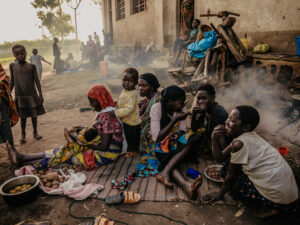
Community members displaced by fighting at a primary school serving as a displacement site in Rutshuru, DRC
Toronto, 21 July 2022 – At least 100 children have lost or been separated from their parents in recent weeks during renewed clashes in the east of Democratic Republic of Congo (DRC), with Save the Children arranging foster care for these children while searching for their families.
Many of the unaccompanied children from Rutshuru in North Kivu province were separated from their parents or caregivers while fleeing for their lives as fighting intensified. Others lost their parents to the violence.
Clashes between non-state armed groups and state armed groups in Rutshuru territory have forced at least 10,400 households – including at least 43,000 children – from their homes in the past three months. Most of the families have moved to neighbouring territories in DRC, while more than 11,000 people have taken shelter across the border to Uganda. Nearly 60% of those displaced by the violence are children.
Save the Children is gravely concerned for the mental and physical wellbeing of these unaccompanied and separated children. Separated children face enormous challenges in meeting their basic needs, lacking the people in their lives who would usually help them find food, water, and shelter.
Jacques*, 16, is currently seeking shelter with his family at a welcome centre for displaced people in North Kivu, supported by Save the Children:
“That day we were in the village, and when the shots rang out, I was afraid, my mother was afraid too. We fled, leaving our goods in the house. When it seemed quieter, I went home to get our personal belongings, but they had already been stolen. There wasn’t even a pot left to cook with. I used to go to school but because of this war I don’t go anymore.
“This life, moving back and forth, is a great pain because we lose a lot. We run away and when we come back, we don’t have anywhere to sleep.”
About 64% of the newly displaced people have found refuge in collective sites and centres such as churches, schools, stadiums, with the remaining people finding shelter with host families in a community already struggling with poverty and a lack of food.
DRC is the African country with the highest number of internally displaced people, with an estimated 5.5 million currently displaced in a population of about 90 million. Conflict has been raging in parts of the country for two decades, and children are paying the heaviest price.
Save the Children is working in the northern part of DRC to trace and reunify families and to provide mental health and psychosocial support for separated and unaccompanied children, child victims of abuse, and those showing signs of profound traumatic impacts. From April to June 2022, Save the Children provided psychosocial support to 1,200 displaced children in DRC through child-friendly spaces, where children can play and recover.
Amavi Akpamagbo, Save the Children’s Country Director in the Democratic Republic of Congo, said:
“Donors and governments must increase their efforts to ensure the most vulnerable children are protected in this conflict. The crisis in DRC is a children’s crisis. Children are being doubly harmed by being forced to leave their home in terror, and then while fleeing, lose their parents in the chaos. Sometimes they lose track of their parents for days or even weeks and in the most tragic of situations, they have lost their parents forever. We are deeply concerned about the welfare of these children and the significant long-term effect on their physical and mental health.
“Across DRC, we are seeing displaced families deprived of their basic needs, such as clean water, food, shelter, essential household items and primary health care. Security access to help them also remains a major challenge “
The humanitarian situation in the DRC remains extremely fluid, the result of continuing conflicts between communities and between non-state armed groups and security forces, ongoing social and economic challenges and extreme weather events. An estimated 27 people – or 28% of the population – is experiencing crisis levels of acute food insecurity, making DRC currently one of the world’s largest hunger crises. More than 220,000[1] people are facing food insecurity in the territories impacted by conflict; at least 29,000 children are acute malnourished, including 13,000 who are affected by severe acute malnutrition, the most dangerous form of malnutrition.
Following the intensification of armed violence and the increase of the humanitarian needs in eastern DRC, Save the Children is running programs to support displaced children and their families. These programs, operating across North Kivu, Ituri and South Kivu, provide vital education and child protection support to protect children’s futures. We’re also repairing damaged schools and supplying learning materials so that children can return to school, and we’re delivering psychosocial support and providing children with safe spaces to play and learn, whilst they recover from horrors no child should ever face.
[1]https://www.humanitarianresponse.info/sites/www.humanitarianresponse.info/files/documents/files/20220628_v100_ocha_drc_nordkivu_crise_rutshuru_nyiragongo_apercu_humanitaire_en.pdf
END
Media Contact
For additional information please contact Tiffany Baggetta, Head of Communications, Media and PR:
About Save the Children
Save the Children believes every child deserves a future. In Canada and around the world, we give children a healthy start in life, the opportunity to learn and protection from harm. We do whatever it takes for children – every day and in times of crisis – transforming their lives and the future we share.


